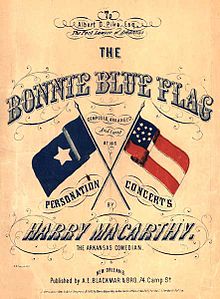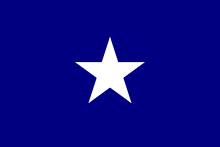- The Bonnie Blue Flag
-
The Bonnie Blue Flag, aussi connu comme We Are a Band of Brothers, est une chanson de marche associée aux États confédérés d'Amérique. Les paroles ont été écrites par Harry McCarthy en se basant sur la mélodie de la chanson The Irish Jauting Car.
Sommaire
Histoire
Le titre de la chanson fait référence au premier drapeau non-officiel de la Confédération : le Bonnie Blue flag qui porte une seule étoile.
The Bonnie Blue Flag a une signification spéciale au Texas. La chanson a été présentée par l'auteur Harry McCarthy pendant un concert à Jackson, Mississippi, au printemps 1861 et a été jouée de nouveau en septembre de la même année à l'Académie de musique de la Nouvelle-Orléans pour le premier régiment d'infanterie volontaire du Texas.
La maison de disques de la Nouvelle-Orléans de A.E. Blackmar a sorti six éditions de la chanson entre 1861 et 1864 avec trois arrangements additionnels. Le terme "Band of Brothers" mentionné dans la première ligne de la chanson est un clin d'œil au discours du jour de la St Crépin dans la pièce Henry V de William Shakespeare jouant la pièce .
Paroles
We are a band of brothers and native to the soil
Fighting for our Liberty, With treasure, blood and toil
And when our rights were threatened, the cry rose near and far
Hurrah for the Bonnie Blue Flag that bears a single star!- (Refrain)
- Hurrah! Hurrah!
- For Southern rights, hurrah!
- Hurrah for the Bonnie Blue Flag that bears a single star.
As long as the Union was faithful to her trust
Like friends and like brethren, kind were we, and just
But now, when Northern treachery attempts our rights to mar
We hoist on high the Bonnie Blue Flag that bears a single star.- Refrain
First gallant South Carolina nobly made the stand
Then came Alabama and took her by the hand
Next, quickly Mississippi, Georgia, and Florida
All raised on high the Bonnie Blue Flag that bears a single star.- Refrain
Ye men of valor gather round the banner of the right
Texas and fair Louisiana join us in the fight
Davis, our loved President, and Stephens statesmen rare
Now rally round the Bonnie Blue Flag that bears a single star.- Refrain
Now here's to brave Virginia, the old Dominion State,
With the young Confederacy at last has sealed her fate,
And spurred by her example, now other states prepare
To hoist high the bonnie blue flag that bears a single star.- Refrain[1]
Then cheer, boys, cheer, raise a joyous shout
For Arkansas and North Carolina now have both gone out,
And let another rousing cheer for Tennessee be given,
The single star of the Bonnie Blue Flag has grown to be eleven.- Refrain
Then here's to our Confederacy, strong we are and brave,
Like patriots of old we'll fight, our heritage to save;
And rather than submit to shame, to die we would prefer,
So cheer for the Bonnie Blue Flag that bears a single star.- Refrain[2]
Modification apportée dans les paroles
Le premier couplet de la chanson est :
« We are a band of brothers and native to the soil,
Fighting for the property we gained by honest toil;
And when our rights were threatened, the cry rose near and far,
Hurrah! for the Bonnie Blue Flag that bears a single star. »La deuxième ligne est parfois remplacée par cette phrase : « fighting for our liberty with treasure, blood, and toil ».
Selon Schoenherr, la partition a été éditée la première fois en 1861 par A.E. Blackmar et frère à la Nouvelle-Orléans. Après avoir capturé et arrêté Blackmar, le Général Benjamin Butler lui infligea une amende de 500 $ USD et détruisit toutes les copies de la musique. Il ordonna ensuite que quiconque surpris en train de siffler ou de chanter le «Bonnie Blue Flag » serait condamné à payer une amende de 25 $ USD (environ 482 $ en 2005)[3]. Onze autres éditions de la chanson ont été éditées avec différents textes.
Sources et références
- (en) Cet article est partiellement ou en totalité issu de l’article de Wikipédia en anglais intitulé « The Bonnie Blue Flag » (voir la liste des auteurs)
Liens externes
- The Bonnie Blue Flag, Polk Miller and his Old South Quartet (Edison Blue Amberol 2175, 1913)—Cylinder Preservation and Digitization Project.
- Lyrics and melody to the song, including a refutation of the alternate lyrics
- Photos of the cover and song sheet dated from 1861, as well as historical trivia regarding the song
- Sheet music for "The Bonnie Blue Flag", from Project Gutenberg
- MIDI for "The Bonnie Blue Flag", from Project Gutenberg
- "Songs of the civil war" Jim Gibson, solo piano. cd HCM 1860. Hickoru Cove Music, Atlanta GA. USA.2001.
- "Songs of the civil war" Jim Brown / Ken Burns / Don De Vito. cd Columbia, New York NY. USA.1991
- (Refrain)
Wikimedia Foundation. 2010.


